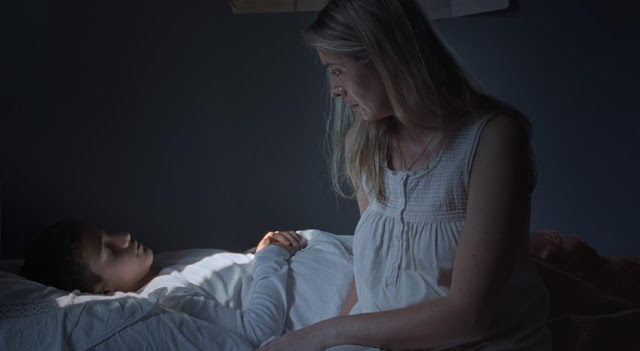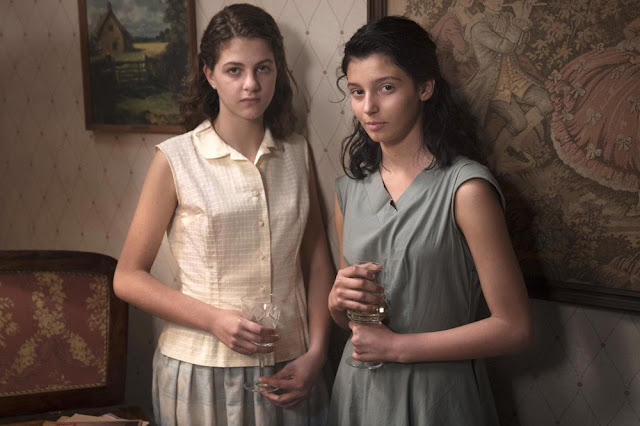Beginning
(Español / English)
Yana (Ia Sukhitashvili) es la esposa del líder de una comunidad de Testigos de Jehová en un pueblo de Georgia (el país), donde la mayoría de la población profesa la fe cristiana ortodoxa y los ve con malos ojos. Su tarea comunitaria es impartir clases preparatorias para el bautismo a los niños de la congregación. Un grave incidente en la sala de reuniones de la comunidad (magníficamente filmado) determina la partida de su esposo durante unos días y que ella quede sola con su hijo. Las inesperadas agresiones que padece durante esa ausencia se suman a la soterrada crisis que venía transitando.
Beginning es la ópera prima de la joven directora Dea
Kulumbegashvili que ganó nada menos que cuatro premios mayores del Festival de
San Sebastián 2020 (película, dirección, guion y actriz protagónica) de manos
del presidente del jurado Luca Guadagnino y fue seleccionada para representar a su país para los premios Oscar.
¿Cómo abordar la reseña de esta película original y radical
en tantos sentidos?
Desde lo formal, la directora recurre virtuosamente a larguísimos planos fijos (es decir, tomas sin cortes donde la cámara no se mueve), tanto para las escenas intimistas y de una quietud hipnótica como para otras que no permiten escapar al espectador de un cuadro de violencia. Más notable aún es el original uso del sonido fuera de campo (es decir manteniendo en una escena fuera de la imagen ciertos sucesos o personajes), con efectos literalmente inquietantes. Se suma una bella fotografía y una ausencia casi total de banda sonora.
Yana es una mujer que abandonó su vocación de actriz para seguir y acompañar a su esposo. Es decir, que opta por pertenecer a una comunidad donde domina un sutil machismo doméstico, social y religioso, con la culpa y el castigo como insumos esenciales de dominación. Una comunidad inserta a su vez en un entorno nacional y religioso absolutamente hostil.
Yana es una mujer insatisfecha que por un lado no termina de asumir su rol de víctima, a pesar del cerco de agresiones que se va levantando alrededor de ella, pero que al mismo tiempo va incubando alguna manera de superarlo en esos largos tiempos muertos que la vemos transitar.
Beginning admite más de una lectura. Puede verse como una suerte de tragedia bíblica que remite en parte al cine de Dumont y al de Lars Von Trier, donde algún personaje cumple acaso un rol alegórico no por una obviedad del guion sino por los códigos que sojuzgan a la protagonista y condicionan su mirada.
NOTA: luego de la versión de MUBI, sigue un interesante reportaje de Luca Guadagnino a la directora.
Yana (Ia Sukhitashvili) is the wife of the leader of a
community of Jehovah's Witnesses in a town in Georgia (the country), where the
majority of the population profess the Orthodox Christian faith and sees them
with bad eyes. Her community task is to teach classes in preparation for
baptism to the children of the congregation. A serious incident in the
community meeting room (superbly filmed) determines the departure of her
husband for a few days and she is left alone with her son. The unexpected
aggressions that she suffers during that absence are added to the buried crisis
that she had been going through.
Beginning is the debut feature by the young director Dea Kulumbegashvili that won no less than four major prizes at the 2020 San Sebastian Festival (film, direction, script and leading actress) from the president of the jury Luca Guadagnino and it was selected to represent its country for the Oscars.
How to approach the review of this original and radical film in so many ways?
From the formal point of view, the director virtuously resorts to extremely long fixed shots (that is, shots without cuts where the camera does not move), both for intimate scenes with a hypnotic stillness and for others that do not allow the viewer to escape from a painting of violence. Even more remarkable is the original use of sound out of the field (that is, keeping certain events or characters in a scene out of the picture), with literally disturbing effects. A beautiful photograph is added and an almost total absence of a soundtrack.
Yana is a woman who abandoned her vocation as an actress to follow and accompany her husband. In other words, she chooses to belong to a community where she dominates a subtle domestic and another more explicit social and religious male chovinism, with guilt and punishment as essential inputs for domination. A community in turn inserted into an absolutely hostile national and religious environment.
Yana is a dissatisfied woman who, on the one hand, does not finish assuming her role as a victim, despite the siege of aggressions that is rising around her, but who at the same time is incubating some way to overcome it in those long dead times that her we see transit.
Beginning supports more than one reading. It can be seen as
a kind of biblical tragedy that refers in part to the cinema of Dumont and that
of Lars Von Trier, where some character perhaps fulfills an allegorical role
not because of the obviousness of the script but because of the codes that
subdue the protagonist and determine the look her.






Comentarios
Publicar un comentario
Mensajes sujetos a moderación